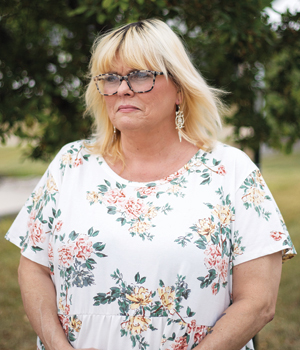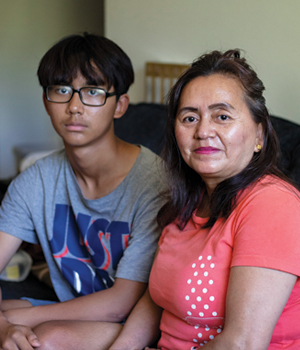Marie (named changed for confidentiality) works at a food pantry. But many of her patrons don’t know she is feeding her own family with food from the selves.
Writer: Rachel Vogel Quinn
Photographer: Emily Blobaum
Listen.
These are stories of food insecurity in Iowa. They illustrate the many issues intimately intertwined with hunger in the United States: child care, transportation, job loss, divorce, education, mental health, disability, immigration, incarceration, addiction.
Start tugging at one of these threads and others start to unravel. Pretty soon our whole society is laid bare.
But the Iowans in this article are more than statistics representing a vast and complex social problem. They are people with particular passions and pastimes, motivations and melancholies, favorite foods and inside jokes. They all have family and friends who love them. They each have their own unique reasons to survive.
What they most share in common is not food insecurity, but a trait that has sustained our species for millennia: Perseverance. Endurance. A stubborn drive to survive. A hunger to keep hustling, keep hoping, keep holding on.
Pandemic Problems
After running an Ottumwa food pantry for more than a decade, Marie* has become one of her own clients, forced to feed her family from the shelves she stocks.
The trouble began during summer 2020, as the pandemic strained businesses across the country. On their 21st wedding anniversary, Marie’s husband was laid off from his job. It took him only five weeks to find a new role in Wisconsin. But the temporary reduction in income, plus the costs of running two households, threw the family’s finances into disarray.
While Marie, 42, searches for a job near her husband, she tends to two teenage children and works two jobs. When her grocery budget is exhausted, she brings home food from the pantry. A weekend visit to her parents in Missouri covers two days of meals. Some days, all she has is a snack.
“My priority is to make sure my kids eat,” Marie says.
She feels the same way about her clients at the food pantry. She strives to treat them with dignity and respect, soothing any shame they might feel about their circumstances. She stocks the hallway with fresh produce and cookbooks. She delights in giving away cookies to families with kids, helping parents maintain a sense of normalcy at home. But her favorite part of the job is listening to her clients’ stories.
“Sometimes, coming to the food pantry is the only outlet they have,” Marie says. “Some days, I’m pretty sure I’m the only person they talk to.”
Although Marie hasn’t shared her own food insecurity with clients, the board knows she’s using the pantry to supplement meals for her kids. She says the experience has made her a better pantry director.
“I understand what my clients are going through a lot better,” Marie says. “Not that I wasn’t compassionate already, but now I can legitimately empathize with them.”
*Name changed for privacy reasons. Other identifying details have been withheld to protect the source’s anonymity.

Candy and Water
When Mike Niemeyer, 24, gets hungry, he walks to the QuikTrip near his Des Moines apartment to grab a burrito from the cooler or a candy bar. He doesn’t often eat full meals or visit the grocery store. The habit is a holdover from his days of homelessness, a period he says changed his relationship with food.
“I could find food. I could eat,” Niemeyer says of his life now. “But I’ve trained my body so much that I can just survive off water.”
As a teenager, Niemeyer’s rebellious behavior and drug use landed him in juvenile detention. After a short stint in adult prison, he had no money and nowhere to stay. To stop his stomach cramps, he sometimes stole candy from gas stations.
“When you’re in poverty, you’ve got to find a way to provide for yourself,” he explains, though he says he regrets his actions now.
Niemeyer tried several rehab programs before finding success at YSS, which provides mental and behavioral health services to children, teens and young adults. They challenged him to think about where his lifestyle was leading him. He realized he was spending more money on drugs than on food. And he recognized his social circle was reinforcing that lifestyle. He asked his parents to delete his Facebook account. His mother messaged all 5,000 of his friends to let them know Niemeyer was leaving the platform.
“I was a new person,” he says. “I started a new beginning.”
In 2018, Niemeyer joined the job training program at Justice League of Food. Founded by Nick Kuhn, owner of the Hall in West Des Moines, the organization offers a two-year paid apprenticeship to homeless and food-insecure individuals, training them to work in the food and beverage industry.
Working as a line cook at the Hall has boosted Niemeyer’s confidence and helped him overcome anxiety. He says his strongest value is responsibility. His life goal is to master three skills: cooking, gardening and skateboarding. He plans to enroll in culinary school, and he dreams of someday growing vegetables to serve his future wife and kids.
“If you don’t say you quit,” Niemeyer reflects, “then you can just keep going, keep working on it. And then you’ll succeed.”

Cutting Corners
Mary Newberg, 54, has been living as cheaply as possible in Montezuma since her divorce two years ago.
“I had to [start] over on everything,” she says. “In recent years, I have learned how to cut corners and make everything affordable.”
Reeling from the financial repercussions of the divorce, Newberg struggled to afford rent and car payments. Her brother helped her find a rent-controlled apartment for senior citizens and people with disabilities. Newberg has been deaf since she was 6, but she’s an expert lip reader and uses a special device to help her communicate over the phone. She supports herself through a part-time job at Casey’s General Store and receives Social Security disability benefits as a supplement.
But Newberg’s fragile financial situation fell apart during the pandemic, when she started losing shifts at Casey’s. She had to find even more expenses to cut, including cable television and credit cards. She stopped making payments on her storage shed. She worries she’ll soon be evicted.
“Money is very tight,” she says. “I don’t buy anything I don’t need. Thank God I like to stay home.”
The Montezuma Food Pantry has been a lifeline for Newberg. Every two weeks, they deliver enough ingredients for several meals. Sometimes they add additional boxes with fruit, rotisserie chicken and milk.
“In my head, it’s a sense of security,” Newberg says, “knowing that I’m never going to go hungry.”
Although she wishes she didn’t have to rely on the food pantry, Newberg says she’s lucky to have it as a resource. She wants to thank anyone who has worked to fight hunger in Iowa, especially the food pantry staff and volunteers who make sure her fridge is never empty.
“We have hunger right here in the United States, more than people know,” she says. “If it wasn’t for the food pantry, I don’t know what I would do.”
A Daily Drive
During the winter of 2008, her first in the United States, Paw Sher had to walk an hour through the snow to reach the nearest grocery store. In the years since then, as she adjusted to life in Des Moines, food stopped being a problem for her family—until the pandemic.
Now 33, Sher and her partner, Manuel, have five children between the ages of 1 and 10. Unable to afford child care, Sher stays home with the kids while Manuel commutes to a meatpacking plant in Perry. In her free time, Sher is learning English through a community-based class.
In 2020, as schools closed, Sher’s older children lost the free breakfast and lunch they ate in the cafeteria. Then Manuel tested positive for COVID-19 and missed two weeks of work. To make up for the lost pay, he worked temporary overtime at the plant. But the extra hours put him over the income limit for food assistance, known as SNAP (the Supplemental Nutrition Assistance Program). The family lost their benefits, and Manuel now works as many hours as possible to try to cover the gap.
Sher’s situation is an example of the “cliff effect,” a term that describes how government benefits drop sharply after a household edges over the income limit for the program. Often, the small increase in wages doesn’t cover the value of the lost benefits, pushing the family into a deeper financial hole. The cliff effect can also occur for child care, health insurance, energy assistance and other benefit programs.
Stressed and frustrated, Sher is appealing the decision to end her SNAP benefits with the Iowa Department of Human Services. The denial letter she received only listed four of her five children. But the appeal process is time-consuming—and expends precious gas with trips to the office.
Most of the gas money goes toward the 35-minute drive to the food pantry, which Sher makes four or five times a week. Some days, they don’t have any food left to give her. Other days, her only choice is expired items, which she won’t feed her kids. Sher also worries that processed American food is bad for their health.
“If we had food assistance, I could go to the grocery store and pick out fruits and vegetables for the kids,” she says.
Despite the daily challenges, Sher is grateful for the resources and opportunities available in the United States. A member of the Karen ethnic group, she was born and raised in a refugee camp in Thailand, where school was only for those with money. In third grade, when her mother fell sick, Sher dropped out of school to care for her siblings. Every day, she made a two-hour trek into the forest to forage for home-construction materials, which she sold to support the family.
“Here, people are treated equally,” Sher says. “It doesn’t matter if you are from a lower-class family or an upper-class family. Back home, it was totally different. If you’re a lower-class family, they didn’t see you as people.”
Interpretation provided by Mu Paw, social work intern at EMBARC.

The Will to Work
More than anything in the world, Zoram Thangi wants a job.
An ethnic Mizo Chin from Myanmar (also known as Burma), Thangi came to Des Moines as a refugee seven years ago, just a few years after her husband died. She is a single mother to a 13-year-old son, Vanlal.
Thangi, 52, underwent three surgeries on her spine, including the insertion of a steel rod. The pain prevents her from sitting or standing for long periods of time. Her English skills are also limited. But she’s certain there’s a job she can do somewhere.
“I just want to work, to provide for myself,” Thangi says. “If I can do that, it will make me happy.”
Thangi and her son stay afloat with $300 a month in food assistance and $400 in Social Security disability benefits. Most of that money goes toward car payments, rent and utilities. Friends provide her with clothes. Once a month, she goes to the food pantry.
“I have a blessing, and I really love it. I’d like to thank everyone,” Thangi says. “But it’s hard to be in that position all the time, asking for a favor, asking for a gift.”
Thangi says she doesn’t envy other people who own houses, nice clothes or jewelry. She’s just jealous of their ability to work. She devotes much of her free time to prayer, and she asks others to pray for her, too.
“I am really thankful to God,” she says. “Because of my prayers, I’m able to survive. When I look at myself from the world’s eyes, I have nothing. Just because of God, I am still living.”
Thangi believes that if she had stayed in Burma, she would have died from a lack of medical care. Although she misses family members there, she loves living in Des Moines, where her son can receive a free education.
“The government is very good to me,” Thangi says. “The U.S. is amazing for me.”
Vanlal is the reason she keeps living, Thangi says. She agonizes over how she’ll pay his college tuition. Her goal is to see him grow into a happy, resourceful adult. Then he can return the care she has given him over the years.
“I’m not expecting too much, as long as I can eat,” Thangi says. “As long as he can provide me with food, I’m happy.”
Interpretation provided by Jessie Lalneihpuii, administrative assistant and youth program coordinator at EMBARC.

The Way Back Home
When he was still a teenager in Waterloo, Nick Miller’s father gave him meth for the first time.
“I was brought up around drugs my whole life,” he says. “It was just like an everyday occurrence. I thought it was normal for a family to do that.”
Miller, now 55, says he “got addicted real bad” to snorting meth, though he was always trying to quit. Sometimes he was clean for a few years. In his 30s, he got married, bought a house and had three kids. While working as a long-haul truck driver, he started smoking meth to keep himself awake behind the wheel. Soon he was buying more and more to sustain the habit.
When his dealer was arrested, Miller was implicated, too. He was eventually sentenced to 18 years in federal prison. Before he went in, he quit meth and has been clean for nearly 20 years, which he calls his proudest achievement.
“I had the mindset that it’s just over,” Miller says. “It’s ruined my life. I got to stop.”
In the fall of 2019, Miller was released on parole and enrolled in the Supplemental Nutrition Assistance Program (SNAP), more commonly known as food stamps.
“At first I was a little embarrassed using it, but I guess I got over that,” he says. “Otherwise, I’d be pretty hungry.”
Miller also started using the Double Up Food Bucks program, which matches the value of SNAP purchases with credit to spend on fresh produce. The watermelons, oranges, apples and bananas he bought helped him lose 45 pounds in a little over a year.
Miller had always planned to get a job after his release, but injuries he sustained in prison led to two major surgeries on his neck. His left leg and foot are paralyzed. He’s also been diagnosed with anxiety, depression and post-traumatic stress disorder.
He currently lives with his aunt and uncle in Cedar Falls. His goal is to move back into the Waterloo home he bought before he was incarcerated. But repairing the severe damage caused by his ex-wife is too expensive, and he can’t afford utilities or furnishings. He applied for Social Security disability benefits but was denied because he owns a house.
To improve his situation, Miller has devoted himself to physical therapy, which has already helped him move from a wheelchair to a leg brace. He hopes to recover enough to get a job and repair his house. He also tries to see his four young granddaughters every week.
Although he’s grateful to his family for supporting him, Miller worries about being a burden to his aunt and uncle, who assure him that’s not the case.
“I’m used to chaos and bad things happening to me,” Miller says. “My uncle tells me to quit thinking like that. No matter the struggles and the outcome, you’ve got to keep pushing forward, hoping for the best and doing your best.”











